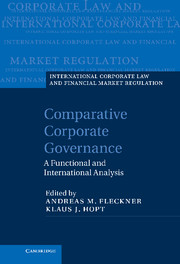Book contents
- Frontmatter
- Contents
- Contributors
- Preface
- Abbreviations
- Part I General report
- Part II National reports
- A Australia and Asia
- B Europe
- 6 Austria
- 7 Belgium
- 8 Denmark
- 9 Finland
- 10 France
- 11 Georgia
- 12 Germany
- 13 Hungary
- 14 Luxembourg
- 15 Netherlands
- 16 Norway
- 17 Poland
- 18 Portugal
- 19 Spain
- 20 Switzerland
- 21 United Kingdom
- C The Americas
- Part III Annex: Questionnaire
- Index
- References
21 - United Kingdom
The scope and dynamics of corporate governance regulation
from B - Europe
Published online by Cambridge University Press: 05 July 2013
- Frontmatter
- Contents
- Contributors
- Preface
- Abbreviations
- Part I General report
- Part II National reports
- A Australia and Asia
- B Europe
- 6 Austria
- 7 Belgium
- 8 Denmark
- 9 Finland
- 10 France
- 11 Georgia
- 12 Germany
- 13 Hungary
- 14 Luxembourg
- 15 Netherlands
- 16 Norway
- 17 Poland
- 18 Portugal
- 19 Spain
- 20 Switzerland
- 21 United Kingdom
- C The Americas
- Part III Annex: Questionnaire
- Index
- References
Summary
General information on corporate governance
Definition and general scope of corporate governance
Definition of corporate governance
There is no formal legal definition of corporate governance in the UK. Traditionally in the UK, internal corporate governance issues such as board structures have tended to be regarded as purely private affairs for the informal resolution of companies and shareholders themselves, as opposed to matters of public concern to be defined and resolved by regulators. The prevailing functional definition of corporate governance in the UK therefore remains the influential one posited by the Cadbury Committee in 1992, which described corporate governance as “the system by which companies are directed and controlled.” One of the most authoritative academic definitions of corporate governance in the UK meanwhile is that provided by Professor John Parkinson, who in more specific terms than Cadbury referred to it as “the processes of supervision and control (of ‘governing’) intended to ensure that the company's management acts in accordance with the interests of the shareholders.”
General scope of corporate governance
More recently, the statutory implementation of the principle of “enlightened shareholder value” under section 172 of the Companies Act 2006 has apparently expanded the orthodox (shareholder-centric) scope of UK corporate governance, by specifying the numerous “stakeholder” interests to which directors should have regard in complying with their statutory duty to promote the success of the company. However, setting aside for now the practical limitations of this provision as an effective non-shareholder protection, it remains the case that the highly influential UK Corporate Governance Code, as descended from Cadbury and promulgated today by the quasi-governmental Financial Reporting Council (“FRC”), is focused exclusively on the protection of shareholders by means of placing appropriate institutional constraints on the decision-making power of senior executive officers.
- Type
- Chapter
- Information
- Comparative Corporate GovernanceA Functional and International Analysis, pp. 913 - 956Publisher: Cambridge University PressPrint publication year: 2013

